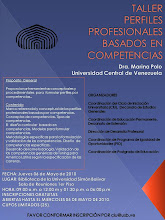viernes, 2 de julio de 2010
THE FUTURE OF THE UNIVERSITY: REFLECTIONS FROM NEW ZEALAND

THE FUTURE OF THE UNIVERSITY: REFLECTIONS FROM NEW
ZEALAND
PETER ROBERTS

jueves, 1 de julio de 2010
ANTONIO CORNEJO POLAR Y LA UNIVERSIDAD POPULAR LATINOAMERICANA. SU EXPERIENCIA COMO RECTOR DE SAN MARCOS
PRIVATIZATION OR MARKETIZATION: EDUCATIONAL DEVELOPMENT IN POST-MAO CHINA

PRIVATIZATION OR MARKETIZATION: EDUCATIONAL DEVELOPMENT IN POST-MAO CHINA
KA HO MOK
GLOBALISATION AND HIGHER EDUCATION DEVELOPMENT: A CRITICAL ANALYSIS

GLOBALISATION AND HIGHER EDUCATION DEVELOPMENT: A CRITICAL ANALYSIS
RUI YANG
Descargar

miércoles, 30 de junio de 2010
Motivación, Aprendizaje y Rendimiento Académico en Estudiantes del Primer Año Universitario

Motivación, Aprendizaje y Rendimiento Académico en Estudiantes del Primer Año Universitario
Alicia Cardozo
Universidad Simón Bolívar, Caracas, Venezuela
acardozo@usb.ve
Palabras claves: Motivación, estrategias, aprendizaje, universitario, validez

Learning, Motivation and Academic Achievement in Venezuelan College Students

Learning, Motivation and Academic Achievement in Venezuelan College Students
Alicia Cardozo H
Universidad Simón Bolívar
Caracas- Venezuela
acardozo@usb.ve
Key words: Motivation, learning strategies, college students.

Issues and perspectives for higher education in Argentina in the 1990s

Issues and perspectives for higher education in Argentina in the 1990s
HECTOR R. GERTEL
Instituto de Economia y Finanzas, Facultad de Ciencias Económicas, Universidad Nacional de Cordoba,

Vinculación entre instituciones educativas y unidades productivas

Vinculación entre instituciones educativas y unidades productivas
ALEJANDRO MUNGARAY
PATRICIA MOCTEZUMA
Sostenido en la visión de economistas que han encontrado una amplia relación entre desarrollo económico y educación, en México el concepto de vinculación entre instituciones educativas y unidades productivas se ha concentrado de manera primordial en los beneficios que ambas pueden obtener de las actividades de investigación. Este enfoque, que relaciona las posibilidades de una investigación de alta calidad con las necesidades de los sectores modernos de la economía, ha dejado de lado el potencial de la vinculación del proceso de formación de profesionales con las necesidades de los sectores tradicionales de la economía, principalmente en el ámbito de las pequeñas empresas, para construir una relación socialmente más sólida entre economía y educación en México. Una propuesta de reorganización curricular sostenida en prácticas educativas complementarias a las existentes ayudaría a redimensionar las posibilidades de una vinculación más amplia y provechosa orientada por el bienestar el empleo como objetivos básicos de la sociedad y como elemento orientador de la política pública respecto de la educación superior

Diversification in Argentine higher education: Dimensions and impact of private sector growth

Diversification in Argentine higher education: Dimensions and impact of private sector growth
CLEMENCIA COSENTINO DE COHEN
Sociology Department, Princeton University,

.png)




























